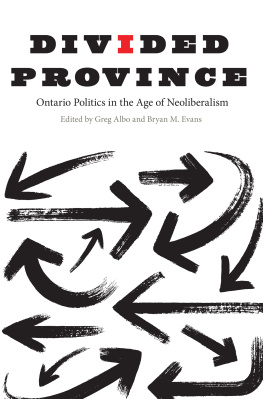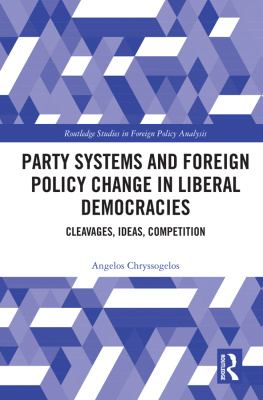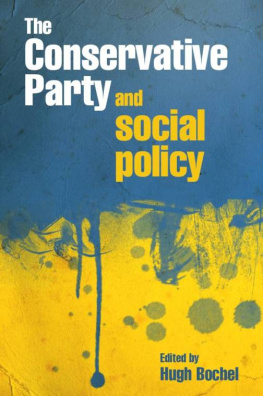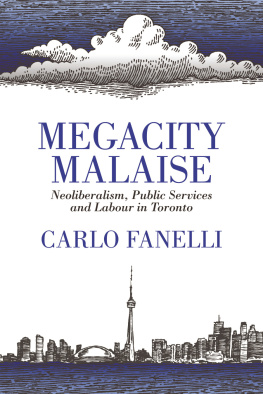
DIVIDED PROVINCE
DIVIDED PROVINCE
Ontario Politics in the Age of Neoliberalism
EDITED BY GREG ALBO AND BRYAN M. EVANS
McGill-Queens University Press
Montreal & Kingston | London | Chicago
McGill-Queens University Press 2018
ISBN 978-0-7735-5473-3 (cloth)
ISBN 978-0-7735-5474-0 (paper)
ISBN 978-0-7735-5567-9 (ePDF)
ISBN 978-0-7735-5568-6 (ePUB)
Legal deposit first quarter 2019
Bibliothque nationale du Qubec
Printed in Canada on acid-free paper that is 100% ancient forest free
(100% post-consumer recycled), processed chlorine free
This book has been published with the help of a grant from the Canadian Federation for the Humanities and Social Sciences, through the Awards to Scholarly Publications Program, using funds provided by the Social Sciences and Humanities Research Council of Canada.
We acknowledge the support of the Canada Council for the Arts, which last year invested $153 million to bring the arts to Canadians throughout the country.
Nous remercions le Conseil des arts du Canada de son soutien. Lan dernier, le Conseil a investi 153 millions de dollars pour mettre de lart dans la vie des Canadiennes et des Canadiens de tout le pays.
Library and Archives Canada Cataloguing in Publication
Divided province : Ontario politics in the age of neoliberalism / edited by Greg Albo and Bryan M. Evans.
Includes bibliographical references and index.
Issued in print and electronic formats.
ISBN 978-0-7735-5473-3 (cloth). ISBN 978-0-7735-5474-0 (paper). ISBN 978-0-7735-5567-9 (ePDF). ISBN 978-0-7735-5568-6 (ePUB)
1. Neoliberalism Ontario History 20th century. 2. Neoliberalism Ontario History 21st century. 3. Ontario Politics and government 19952003. 4. Ontario Politics and government 2003. 5. Ontario Economic policy. 6. Ontario Social policy. I. Albo, Gregory, editor II. Evans, Bryan, 1960, editor
FC3077.2.D58 2018 | 971.304 | C2018-905404-2 C2018-905405-0 |
Set in 11/14 Minion Pro with Ordax and Univers
Book design & typesetting by Garet Markvoort, zijn digital
Contents
Greg Albo and Bryan Evans
Greg Albo
| PART ONE |
THE POLITICAL ECONOMY OF NEOLIBERALISM IN ONTARIO
John Peters
Steven Tufts
Dimitry Anastakis
David Leadbeater
| PART TWO |
TRANSFORMING THE ONTARIO STATE
Robert Drummond
Tammy Findlay
Carlo Fanelli
Charles W. Smith
| PART THREE |
CONSOLIDATING THE NEOLIBERAL POLICY REGIME IN ONTARIO
Peter Graefe and Carol-Anne Hudson
Pat Armstrong and Hugh Armstrong
Mark Winfield and Becky MacWhirter
Alan Sears and James Cairns
| PART FOUR |
DEMOCRATIC POLITICS AND SOCIAL MOVEMENTS
James Lawson
Grace-Edward Galabuzi
Terry Maley
Stephanie Ross
Tables, Figures, and Maps
TABLES
FIGURES
MAPS
Preface
Ontarios official motto, Loyal she began, loyal she remains, recalls the provinces fidelity to the British monarchy, and its anti-democratic, elitist, and counter-revolutionary ideological origins in the eighteenth century. From these sources onward, the Upper Canadian colonial state established a conservative political and administrative template as it fostered settlement and capitalist development in the province. This political project and consensus endured even through the postwar period of welfare state construction. Patronage, clientelism, brokerage politics, and modest state capacity were and remain the hallmark features of the Ontario state. Unlike other jurisdictions, where the resources and capacities of subnational states were often actively put toward development and projects of social reform, the Ontario case is one of, at best, limited ambitions, apart from building capitalism and protecting the rights of private property in the province.
The passage from this conservative state form (with its close alliances between state elites and capitalist classes) to a neoliberal one is still consequential in many respects. First, the centralizing and increasingly authoritarian tendencies within neoliberalism are strengthened, and, secondly, the fragility and weakness of the existing administrative state structures easily lend themselves to neoliberal restructuring efforts that meet with little or no resistance within or outside of the state. Ontarios turn to neoliberalism started in the 1980s, but had not been clearly set until the arrival of the Mike Harris-led Common Sense Revolution in 1995, which firmly embedded the neoliberal project within the Ontario state and political economy. The Harris Conservatives jettisoned the partys previous One Ontario ideology and practice, in the wake of its historic 1985 defeat, and became a party of the hard right. A decade of the Dalton McGuinty Liberal government amply demonstrated that while the rather crude and aggressive variant of neoliberalism expressed by the Common Sense Revolutionaries may have been defeated in 2003, neoliberalism itself endured. Indeed, this project was deepened and advanced by the Liberals as a more politically sustainable endeavour under their leadership, including over the premiership of Kathleen Wynne after 2013. The defeat of the Liberals and the election of a Progressive Conservative government led by Doug Ford in June 2018 disrupted the political hegemony of the Liberals. But the hard right populist platform of the Conservatives is even more firmly committed to the market-expanding policies of neoliberalism.
At this juncture, Ontarios state and economy share several characteristics synonymous with neoliberal markets and administration. These include: the dominance of the service and financial sectors; an increasingly internationalized economy; decentralized and marketized public service delivery; a highly centralized decision-making process at the apex of the state relatively insulated from legislative accountability; and a politicized senior bureaucratic elite circulating between the corporate and state sectors. This trajectory in institutional form and policy practices has serious implications for further eroding already thin and formal liberal democratic structures and processes, as well as circumventing any serious consideration of a more radical democracy and redistributive policy agenda.
In addition to these general institutional characteristics, neoliberalism as a policy regime can be defined as a market-enhancing approach to governance and, as such, represents an ideological shift toward a different and in many ways more active role of the state in expanding capitalist-led economic and social development. In attempting to enhance the scope of market allocation and private power, neoliberal policies build upon principles of competition, laissez-faire, efficiency, productivity, profitability, and individual autonomy. These are manifested in policy forms such as liberalization, deregulation, privatization, and an erosion of worker protections as well as redistributive programs. In other words, neoliberal policy regimes attempt to ensure the social reproduction of the class and extra-market institutional conditions for capital accumulation through various market and pricing mechanisms. Neoliberal policy practices have major effects institutionally: the hollowing out of certain regulatory capacities of the state; the monetizing and marketizing of public assets; the concentration of political power in the central executive, particularly in the leaders office; and the re-ordering of state apparatuses to increase the control and management functions of the central economic agencies, strengthen the mandates and capacities of the policing, carceral, and security apparatuses, and limit the resources and role of other departments and agencies of the state. Neoliberalism is fundamentally misconceived, then, if interpreted as a policy regime setting markets against states. Quite the opposite, the neoliberal state form plays a crucial role in building, extending, and internationalizing markets.
Next page







